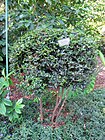Note: This is a project under development. The articles on this wiki are just being initiated and broadly incomplete. You can Help creating new pages.
Difference between revisions of "Triphasia trifolia"
| Line 1: | Line 1: | ||
[[File:Kampong - Triphasia trifolia.jpg|thumb|right|''Triphasia trifolia'']] | [[File:Kampong - Triphasia trifolia.jpg|thumb|right|''Triphasia trifolia'']] | ||
| + | '''Lime berry''' is an evergreen shrub usually growing 1 - 3 metres tall, occasionally to 7 metres. The plant is armed with sharp spines. The plant has several local uses, providing food, medicines and various materials. It is widely cultivated in tropical areas especially as an ornamental and hedge plant, but also for its edible fruit. | ||
==Uses== | ==Uses== | ||
| − | {{Uses|}}, {{Uses|}}, {{Uses|}}, {{Uses|}}, {{Uses| | + | {{Uses|Diarrhoea}}, {{Uses|Colic}}, {{Uses|Skin diseases}}, {{Uses|Coughs}}, {{Uses|Phlegm}}.<ref name="Uses"/> |
==Parts Used== | ==Parts Used== | ||
| − | {{Parts Used| | + | {{Parts Used|Fruits}}. |
==Chemical Composition== | ==Chemical Composition== | ||
| − | <ref name="chemical composition"/> | + | Sabinene, β-pinene and γ-terpinene also were the major compounds identified in the pentane extract obtained by SDE. This is the first report on the volatiles from T. trifolia cultivated in the State of Pará, Brazil.<ref name="chemical composition"/> |
==Common names== | ==Common names== | ||
| Line 28: | Line 29: | ||
==Habit== | ==Habit== | ||
| − | {{Habit|}} | + | {{Habit|Evergreen shrub}} |
==Identification== | ==Identification== | ||
| Line 47: | Line 48: | ||
==Mode of Propagation== | ==Mode of Propagation== | ||
| − | {{Propagation|}} | + | {{Propagation|Seeds}}, {{Propagation|Cuttings}}. |
==How to plant/cultivate== | ==How to plant/cultivate== | ||
| − | <ref name="How to plant/cultivate"/> | + | Lime berry is cultivated in the tropics and subtropics. A fairly hardy plant, it is able to survive light, short-lived frost, but should be protected from longer frosts or hard freezes.<ref name="How to plant/cultivate"/> |
==Commonly seen growing in areas== | ==Commonly seen growing in areas== | ||
| − | {{Commonly seen|}}, {{Commonly seen| | + | {{Commonly seen|Thickets}}, {{Commonly seen|Arid ground}}. |
==Photo Gallery== | ==Photo Gallery== | ||
| Line 66: | Line 67: | ||
<references> | <references> | ||
| − | <ref name="chemical composition">[ | + | <ref name="chemical composition">[https://www.tandfonline.com/doi/abs/10.1080/0972060X.2009.10643696 Chemical constituents]</ref> |
| − | <ref name="Leaf">[ | + | <ref name="Leaf">[Morphology]</ref> |
| − | <ref name="How to plant/cultivate">[ | + | <ref name="How to plant/cultivate">[http://tropical.theferns.info/viewtropical.php?id=Triphasia+trifolia Cultivation]</ref> |
<ref name="Uses">Indian Medicinal Plants by C.P.Khare</ref> | <ref name="Uses">Indian Medicinal Plants by C.P.Khare</ref> | ||
</references> | </references> | ||
==External Links== | ==External Links== | ||
| − | * [ ] | + | * [https://www.cabi.org/isc/datasheet/108011 Triphasia trifolia on cabi.org] |
| − | * [ ] | + | * [https://pfaf.org/user/Plant.aspx?LatinName=Triphasia+trifolia Triphasia trifolia on pfaf.org] |
| − | + | ||
[[Category:Herbs]] | [[Category:Herbs]] | ||
Latest revision as of 15:40, 27 August 2020
Lime berry is an evergreen shrub usually growing 1 - 3 metres tall, occasionally to 7 metres. The plant is armed with sharp spines. The plant has several local uses, providing food, medicines and various materials. It is widely cultivated in tropical areas especially as an ornamental and hedge plant, but also for its edible fruit.
Contents
- 1 Uses
- 2 Parts Used
- 3 Chemical Composition
- 4 Common names
- 5 Properties
- 6 Habit
- 7 Identification
- 8 List of Ayurvedic medicine in which the herb is used
- 9 Where to get the saplings
- 10 Mode of Propagation
- 11 How to plant/cultivate
- 12 Commonly seen growing in areas
- 13 Photo Gallery
- 14 References
- 15 External Links
Uses
Diarrhoea, Colic, Skin diseases, Coughs, Phlegm.[1]
Parts Used
Chemical Composition
Sabinene, β-pinene and γ-terpinene also were the major compounds identified in the pentane extract obtained by SDE. This is the first report on the volatiles from T. trifolia cultivated in the State of Pará, Brazil.[2]
Common names
| Language | Common name |
|---|---|
| Kannada | |
| Hindi | |
| Malayalam | |
| Tamil | |
| Telugu | |
| Marathi | |
| Gujarathi | |
| Punjabi | |
| Kashmiri | |
| Sanskrit | |
| English |
Properties
Reference: Dravya - Substance, Rasa - Taste, Guna - Qualities, Veerya - Potency, Vipaka - Post-digesion effect, Karma - Pharmacological activity, Prabhava - Therepeutics.
Dravya
Rasa
Guna
Veerya
Vipaka
Karma
Prabhava
Habit
Identification
Leaf
| Kind | Shape | Feature |
|---|---|---|
Flower
| Type | Size | Color and composition | Stamen | More information |
|---|---|---|---|---|
| {{{5}}} |
Fruit
| Type | Size | Mass | Appearance | Seeds | More information |
|---|---|---|---|---|---|
Other features
List of Ayurvedic medicine in which the herb is used
Where to get the saplings
Mode of Propagation
How to plant/cultivate
Lime berry is cultivated in the tropics and subtropics. A fairly hardy plant, it is able to survive light, short-lived frost, but should be protected from longer frosts or hard freezes.[4]
Commonly seen growing in areas
Photo Gallery
References
- ↑ Indian Medicinal Plants by C.P.Khare
- ↑ Chemical constituents
- ↑ [Morphology]
- ↑ Cultivation
External Links
- Ayurvedic Herbs known to be helpful to treat Diarrhoea
- Ayurvedic Herbs known to be helpful to treat Colic
- Ayurvedic Herbs known to be helpful to treat Skin diseases
- Ayurvedic Herbs known to be helpful to treat Coughs
- Ayurvedic Herbs known to be helpful to treat Phlegm
- Herbs with Fruits used in medicine
- Habit - Evergreen shrub
- Index of Plants which can be propagated by Seeds
- Index of Plants which can be propagated by Cuttings
- Herbs that are commonly seen in the region of Thickets
- Herbs that are commonly seen in the region of Arid ground
- Herbs




